倒装和虚拟语气
- 格式:doc
- 大小:62.50 KB
- 文档页数:10
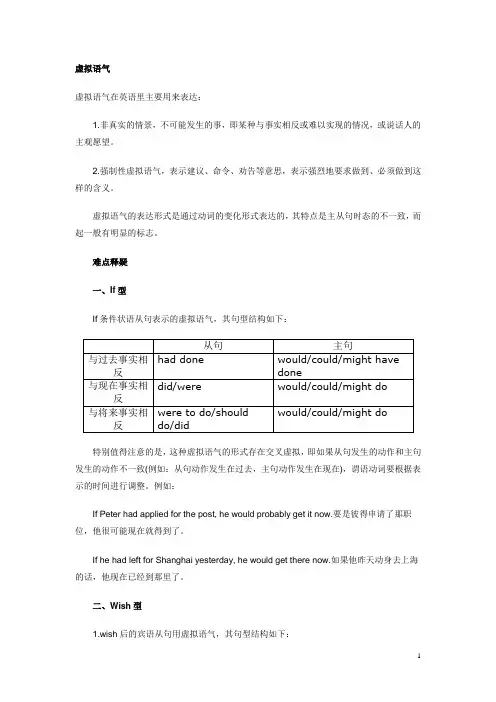
虚拟语气虚拟语气在英语里主要用来表达:1.非真实的情景,不可能发生的事,即某种与事实相反或难以实现的情况,或说话人的主观愿望。
2.强制性虚拟语气,表示建议、命令、劝告等意思,表示强烈地要求做到、必须做到这样的含义。
虚拟语气的表达形式是通过动词的变化形式表达的,其特点是主从句时态的不一致,而起一般有明显的标志。
难点释疑一、If型If条件状语从句表示的虚拟语气,其句型结构如下:特别值得注意的是,这种虚拟语气的形式存在交叉虚拟,即如果从句发生的动作和主句发生的动作不一致(例如:从句动作发生在过去,主句动作发生在现在),谓语动词要根据表示的时间进行调整。
例如:If Peter had applied for the post, he would probably get it now.要是彼得申请了那职位,他很可能现在就得到了。
If he had left for Shanghai yesterday, he would get there now.如果他昨天动身去上海的话,他现在已经到那里了。
二、Wish型1.wish后的宾语从句用虚拟语气,其句型结构如下:与过去事实相反wish that 从句的谓语动词用had done与现在事实相反wish that 从句的谓语动词用did与将来事实相反wish that 从句的谓语动词用would/could do例如:I wish they would change the menu.他们要是改变一下菜单就好了。
I wish I hadn’t spent so much money.我要是没花那么多的钱就好了。
同样地,在as if/as though引导的宾语从句中和以if only引导的带有感叹色彩的虚拟语气句子中,谓语动词与wish引导的宾语从句中的虚拟形式相同。
2.由if only 引导的虚拟语气与过去事实相反if only 谓语动词用had done与现在事实相反if only 谓语动词用did例如:If only she had asked someone’s advice! 她要是征求了别人的意见就好了!3.由as if/as though 引导的虚拟语气与过去事实相反as if/as though谓语动词用had done与现在事实相反as if/as though谓语动词用did例如:He talks about Rome as if he had been there himself.谈论起罗马来就像他去过似的。
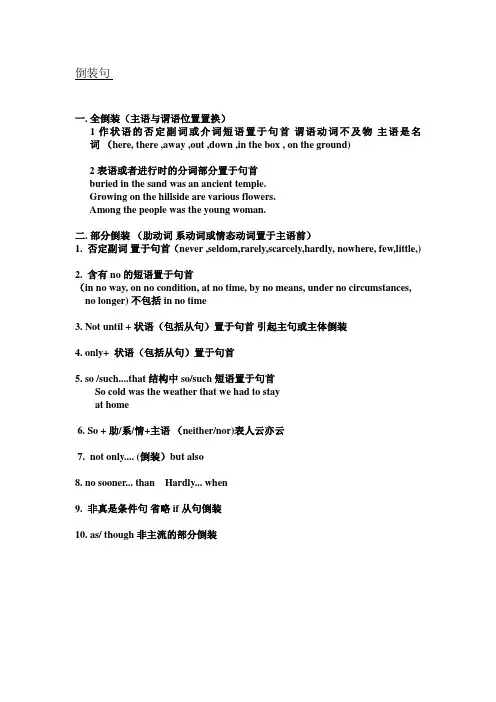
一.全倒装(主语与谓语位置置换)1 作状语的否定副词或介词短语置于句首谓语动词不及物主语是名词(here, there ,away ,out ,down ,in the box , on the ground)2 表语或者进行时的分词部分置于句首buried in the sand was an ancient temple.Growing on the hillside are various flowers.Among the people was the young woman.二. 部分倒装(助动词系动词或情态动词置于主语前)1. 否定副词置于句首(never ,seldom,rarely,scarcely,hardly, nowhere, few,little,)2. 含有no的短语置于句首(in no way, on no condition, at no time, by no means, under no circumstances, no longer) 不包括 in no time3. Not until + 状语(包括从句)置于句首引起主句或主体倒装4. only+ 状语(包括从句)置于句首5. so /such....that 结构中 so/such 短语置于句首So cold was the weather that we had to stayat home6. So + 助/系/情+主语(neither/nor)表人云亦云7. not only.... (倒装)but also8. no sooner... than Hardly... when9. 非真是条件句省略if 从句倒装10. as/ though 非主流的部分倒装(与事实相反的假设表达对未来的美好愿望或者过去的遗憾体现说话人的态度和情绪情感是人类语言复杂含义的表达应用普遍有深意和难度和难度需要有语境和场合)一. 用时态体现的虚拟原则:对现在时间虚拟—-对过去时间虚拟—-对一般将来时间虚拟—-范围范例:1. wish +宾从2. would rather3. as if二 . 用情态动词体现的虚拟should1 . 1 坚持2 命令3 建议4 要求 +宾从(should +动词原形)2. 第一条里的动词的名词或形容词出现在句中相关的名词性从句也一样虚拟3. it is necessary/ important/ strange/ no wonder... that (should )+do4. it is(about/ high)time (that) should do 或者 did其他情态动词对现在对过去should(not)could(not)mightwould(not)needn't三 . 非真是条件句的虚拟从句(用时态)主句(用情态动词)对现在对过去对将来主从句的时间不一致()*隐形虚拟withoutbut forif onlyotherwise。
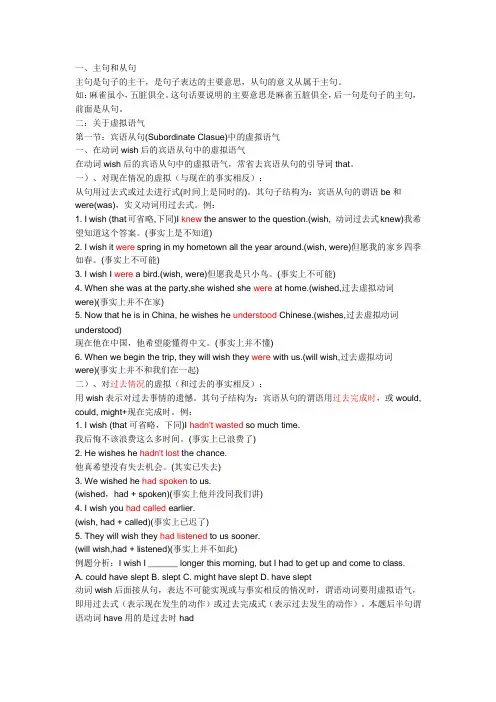
一、主句和从句主句是句子的主干,是句子表达的主要意思,从句的意义从属于主句。
如:麻雀虽小,五脏俱全。
这句话要说明的主要意思是麻雀五脏俱全,后一句是句子的主句,前面是从句。
二:关于虚拟语气第一节:宾语从句(Subordinate Clasue)中的虚拟语气一、在动词wish后的宾语从句中的虚拟语气在动词wish后的宾语从句中的虚拟语气,常省去宾语从句的引导词that。
一)、对现在情况的虚拟(与现在的事实相反):从句用过去式或过去进行式(时间上是同时的)。
其句子结构为:宾语从句的谓语be和were(was),实义动词用过去式。
例:1. I wish (that可省略,下同)I knew the answer to the question.(wish, 动词过去式knew)我希望知道这个答案。
(事实上是不知道)2. I wish it were spring in my hometown all the year around.(wish, were)但愿我的家乡四季如春。
(事实上不可能)3. I wish I were a bird.(wish, were)但愿我是只小鸟。
(事实上不可能)4. When she was at the party,she wished she were at home.(wished,过去虚拟动词were)(事实上并不在家)5. Now that he is in China, he wishes he understood Chinese.(wishes,过去虚拟动词understood)现在他在中国,他希望能懂得中文。
(事实上并不懂)6. When we begin the trip, they will wish they were with us.(will wish,过去虚拟动词were)(事实上并不和我们在一起)二)、对过去情况的虚拟(和过去的事实相反):用wish表示对过去事情的遗憾。
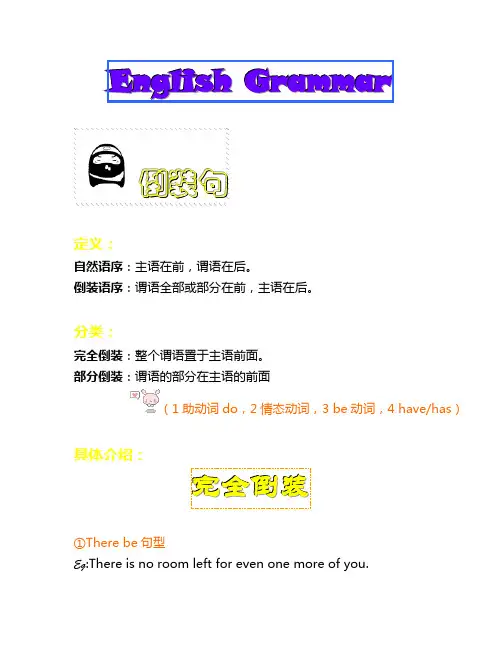
English Grammar 倒装句定义:自然语序:主语在前,谓语在后。
倒装语序:谓语全部或部分在前,主语在后。
分类:完全倒装:整个谓语置于主语前面。
部分倒装:谓语的部分在主语的前面 (1 助动词 do,2 情态动词,3 be 动词,4 have/has)具体介绍:完 全倒装①There be 句型 Eg:There is no room left for even one more of you.②疑问句 Eg: Is breakfast ready yet?③直接引语 Eg:"Can you give me a hand?"said he. ④表祝愿 Eg:May all of you succeed in the coming examination! Eg:May the friendship between the peoples of our countries develop! ⑤表示方向、地点、时间的词位于句首(★): in,out,down,up,off,back,away,over there,there,now,then,here,first Eg:Then followed a shot of gun. Eg:Out rushed the children.★TIPS TIPS(here ,there 倒装,主语是人称代词则是部分倒装) Eg:Here comes your husband. There goes the bell. Eg:Here you are. There he comes.⑥表示方向地点时间的介词短语位于句首(★): Eg:Through the window came in the sweet music. Eg:By his side stood a little boy. ⑦表语长,使句子平衡,尤其是主语带有较长的修饰语时(★) Eg:Ahead sat the old man who told us the stories about the Long March(长征). Eg:Many and long were the conversations they held through the prison way. ⑧用于省略 though/although 的让步状从,提 as(★★★) Eg:Although he was poor ,he was honest. →Poor as he was,he was honest. (adj./n./adv./v.)+as+主+be 动词★TIPS TIPSEg:Although he is a child,he knows a lot about history. →Child as he is,he knows a lot about history. 在这样类型的倒装中,名次前省略冠词,最高级前省略 the Eg:Oldest as he is,he doesn't do well in studies.部 分倒装①否定性质的词或者结构置于句首时(★★) Not,little,hardly,never,no sooner…than…,hardly …when…,not only…but(also),not only…but…as well,at no time,by no means,under no condition,in no case,nowhere,seldom,few,never before,barely(几乎不),scarely Eg:Never shall i forget it. By no means will this method be satisfactory. Hardly had i picked up the phone when he hung up(挂断). Eg:He didn't receive a letter until a week later →Not until a week later did he receive a letter. ②Only 位于句首(★★★) Eg:Only by working hard can we succeed. (介词短语) Eg:Only then did i realized that i was wrong. (adv.副词) Eg:Only when the war was over in 1949 was he able to get back home. (从句)③So(such)…that…置于句首(★)Eg:So angry was he that he couldn't speak . Eg:Such a boy is he that we all love him. ④方式状语,频度状语置于句首(★) often,always,once,many a time,now and then(不时的),every other day(每隔一天) Eg:Often did i spoke of him before. Always does he ask me for money. Eg:Long did we wait before we heard from him. ⑤“也”与上文内容相符的人或事(★★) Eg:——We saw the film last week. ——So did they. Eg:——I have never been aboard. ——Neither/Nor has him.★TIPS TIPS表示对于上文所诉的简单重复肯定时,不倒装! Eg:——Oh,I forget to lock the door ——So you did. ⑥句首省略 If 的虚拟条件句中,句中含有 should,had,were(★★★) Eg:If i were your father,i would give you the money. →Were i your father,i would give you the money.Eg:If it should rain,the crop would grow better. →Should it rain,the crop would grow better. Eg:If he should come tomorrow,i would tell you. →Should he come tomorrow,i would tell you.虚拟语气条件句 与现在相反 If+S+V-ed(be→were) (过去时) S+ 主句 would should could might Eg:If i had time today,i would go with you. 与过去相反 If+S+had done (过去完成时) S+ should Would +have done could might Eg:If i had had time yesterday,i would have gone with you. If i had followed your advice,i wouldn't have maken such a +V(原形)mistake. 与将来相反 V-ed If+S+ should do Were to do S+ Would should Could might +V(原形)Eg:If i were to see him tomorrow,i would very happy.★TIPS: TIPS:1 在虚拟语气中,be 的形式各人称都用 were。
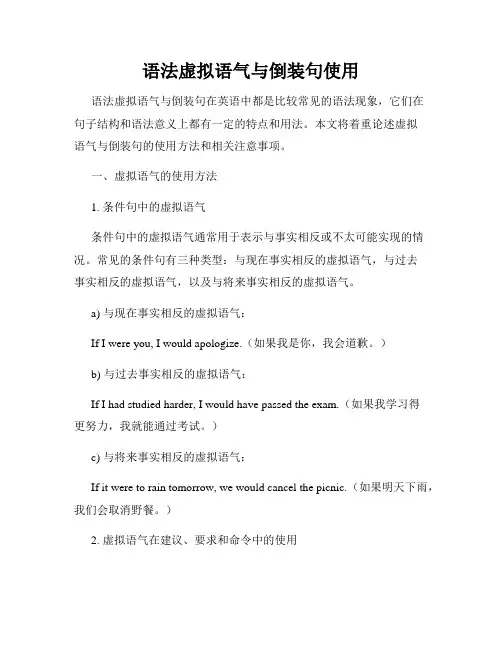
语法虚拟语气与倒装句使用语法虚拟语气与倒装句在英语中都是比较常见的语法现象,它们在句子结构和语法意义上都有一定的特点和用法。
本文将着重论述虚拟语气与倒装句的使用方法和相关注意事项。
一、虚拟语气的使用方法1. 条件句中的虚拟语气条件句中的虚拟语气通常用于表示与事实相反或不太可能实现的情况。
常见的条件句有三种类型:与现在事实相反的虚拟语气,与过去事实相反的虚拟语气,以及与将来事实相反的虚拟语气。
a) 与现在事实相反的虚拟语气:If I were you, I would apologize.(如果我是你,我会道歉。
)b) 与过去事实相反的虚拟语气:If I had studied harder, I would have passed the exam.(如果我学习得更努力,我就能通过考试。
)c) 与将来事实相反的虚拟语气:If it were to rain tomorrow, we would cancel the picnic.(如果明天下雨,我们会取消野餐。
)2. 虚拟语气在建议、要求和命令中的使用虚拟语气还可以用于表示建议、要求和命令等语气中,表示一种虚拟或非现实的情况。
常用的动词有recommend, suggest, insist等。
I suggest that he go to the doctor immediately.(我建议他立即去看医生。
)3. 虚拟语气在表达愿望和建议中的使用虚拟语气还可以用于表示愿望、希望和建议等语气中,通常使用“(should)+动词原形”来表达。
I wish I had more time to travel.(我希望有更多时间去旅行。
)二、倒装句的使用方法倒装句指的是将句子中的主语和谓语动词调换位置,主要有两种类型:完全倒装和部分倒装。
1. 完全倒装完全倒装是将整个谓语动词放在主语之前,通常在以下情况下使用:a) 表示地点、时间或方式的状语置于句首时:On the wall hung a beautiful painting.(墙上挂着一幅漂亮的画。
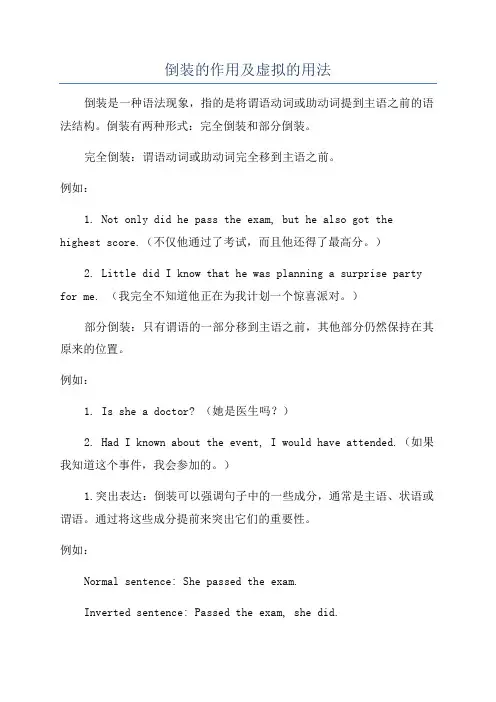
倒装的作用及虚拟的用法倒装是一种语法现象,指的是将谓语动词或助动词提到主语之前的语法结构。
倒装有两种形式:完全倒装和部分倒装。
完全倒装:谓语动词或助动词完全移到主语之前。
例如:1. Not only did he pass the exam, but he also got the highest score.(不仅他通过了考试,而且他还得了最高分。
)2. Little did I know that he was planning a surprise party for me. (我完全不知道他正在为我计划一个惊喜派对。
)部分倒装:只有谓语的一部分移到主语之前,其他部分仍然保持在其原来的位置。
例如:1. Is she a doctor? (她是医生吗?)2. Had I known about the event, I would have attended.(如果我知道这个事件,我会参加的。
)1.突出表达:倒装可以强调句子中的一些成分,通常是主语、状语或谓语。
通过将这些成分提前来突出它们的重要性。
例如:Normal sentence: She passed the exam.Inverted sentence: Passed the exam, she did.2.句子平衡:倒装可以使句子更加平衡,尤其是在使用连词,暗示条件或选择时。
例如:Normal sentence: He not only plays the piano, but also the guitar.Inverted sentence: Not only does he play the piano, but also the guitar.虚拟的用法:虚拟语气是用来表达非现实状态或假设情况的语法结构。
它由虚拟动词(如should, would, could等)引导。
虚拟语气常常用于条件句、建议、愿望、命令等。
例如:1. If I were you, I would go to the party.(如果我是你,我会去参加派对。
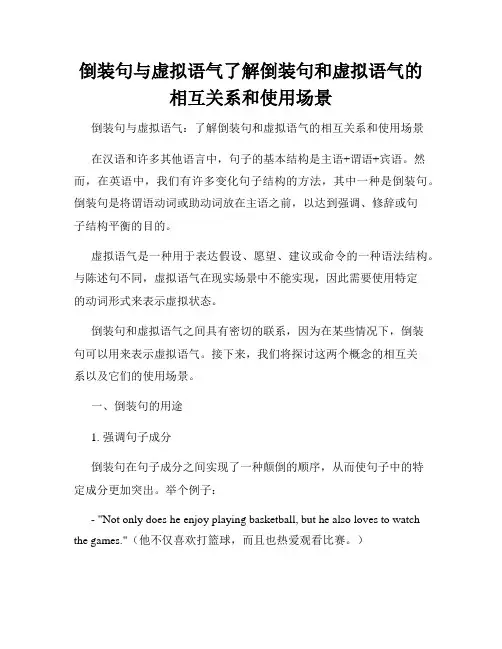
倒装句与虚拟语气了解倒装句和虚拟语气的相互关系和使用场景倒装句与虚拟语气:了解倒装句和虚拟语气的相互关系和使用场景在汉语和许多其他语言中,句子的基本结构是主语+谓语+宾语。
然而,在英语中,我们有许多变化句子结构的方法,其中一种是倒装句。
倒装句是将谓语动词或助动词放在主语之前,以达到强调、修辞或句子结构平衡的目的。
虚拟语气是一种用于表达假设、愿望、建议或命令的一种语法结构。
与陈述句不同,虚拟语气在现实场景中不能实现,因此需要使用特定的动词形式来表示虚拟状态。
倒装句和虚拟语气之间具有密切的联系,因为在某些情况下,倒装句可以用来表示虚拟语气。
接下来,我们将探讨这两个概念的相互关系以及它们的使用场景。
一、倒装句的用途1. 强调句子成分倒装句在句子成分之间实现了一种颠倒的顺序,从而使句子中的特定成分更加突出。
举个例子:- "Not only does he enjoy playing basketball, but he also loves to watch the games."(他不仅喜欢打篮球,而且也热爱观看比赛。
)在这个例子中,倒装句"Not only does he"将主语"he"和谓语"enjoy playing basketball"的顺序颠倒,从而在句子中强调了主语。
2. 条件句中的倒装在条件句(if-clause)中,倒装句可以用来表达可能性、假设或很强的愿望。
例如:- "Had I known about the party, I would have attended."(如果我早知道宴会的事,我就会去参加了。
)这个例子中的倒装句"Had I known"以及后面的虚拟语气结构"would have attended"表达了与现实情况相反的假设。
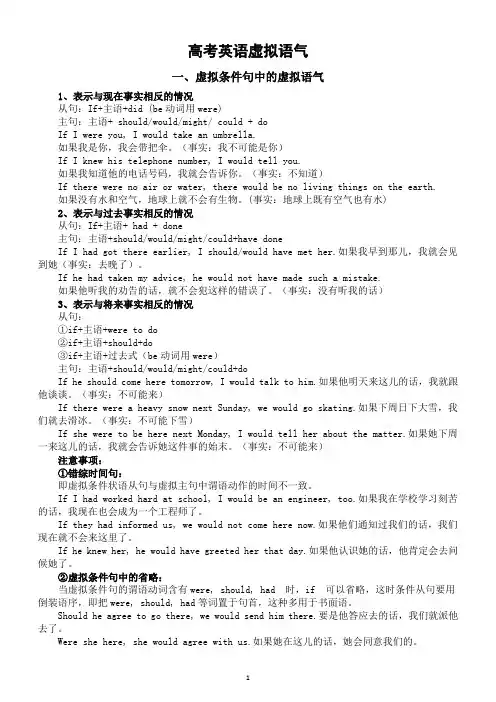
高考英语虚拟语气一、虚拟条件句中的虚拟语气1、表示与现在事实相反的情况从句:If+主语+did (be动词用were)主句:主语+ should/would/might/ could + doIf I were you, I would take an umbrella.如果我是你,我会带把伞。
(事实:我不可能是你)If I knew his telephone number, I would tell you.如果我知道他的电话号码,我就会告诉你。
(事实:不知道)If there were no air or water, there would be no living things on the earth.如果没有水和空气,地球上就不会有生物。
(事实:地球上既有空气也有水)2、表示与过去事实相反的情况从句:If+主语+ had + done主句:主语+should/would/might/could+have doneIf I had got there earlier, I should/would have met her.如果我早到那儿,我就会见到她(事实:去晚了)。
If he had taken my advice, he would not have made such a mistake.如果他听我的劝告的话,就不会犯这样的错误了。
(事实:没有听我的话)3、表示与将来事实相反的情况从句:①if+主语+were to do②if+主语+should+do③if+主语+过去式(be动词用were)主句:主语+should/would/might/could+doIf he should come here tomorrow, I would talk to him.如果他明天来这儿的话,我就跟他谈谈。
(事实:不可能来)If there were a heavy snow next Sunday, we would go skating.如果下周日下大雪,我们就去滑冰。
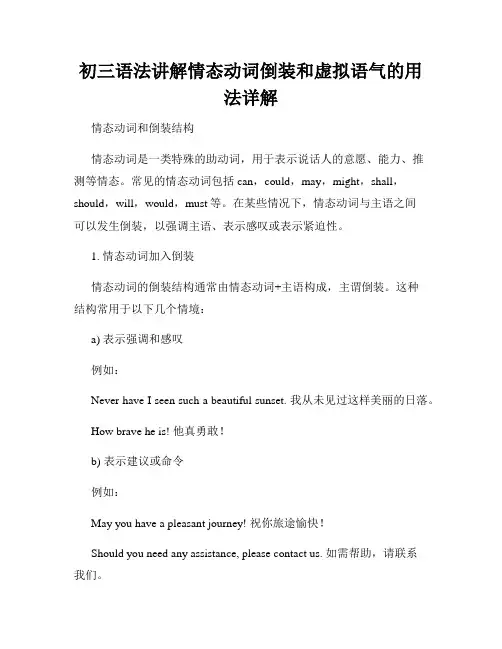
初三语法讲解情态动词倒装和虚拟语气的用法详解情态动词和倒装结构情态动词是一类特殊的助动词,用于表示说话人的意愿、能力、推测等情态。
常见的情态动词包括can,could,may,might,shall,should,will,would,must等。
在某些情况下,情态动词与主语之间可以发生倒装,以强调主语、表示感叹或表示紧迫性。
1. 情态动词加入倒装情态动词的倒装结构通常由情态动词+主语构成,主谓倒装。
这种结构常用于以下几个情境:a) 表示强调和感叹例如:Never have I seen such a beautiful sunset. 我从未见过这样美丽的日落。
How brave he is! 他真勇敢!b) 表示建议或命令例如:May you have a pleasant journey! 祝你旅途愉快!Should you need any assistance, please contact us. 如需帮助,请联系我们。
c) 表示条件例如:Were he here, he would help us. 如果他在这里,他会帮助我们的。
2. 情态动词与not一起的倒装当情态动词与not连用时,可以将not置于句首,构成动词的倒装结构。
这种结构常用于祈使句或表示强调的句子中。
常见的结构有:a) Shall not例如:Shall you not tell her the truth? 你难道不应该告诉她实情吗?b) Will not例如:Will you not accompany me to the party? 你难道不会陪我去参加聚会吗?c) Can not例如:Can you not see the sign? 你难道没有看到标志吗?虚拟语气的用法虚拟语气是表示与事实相反、假设或愿望等非真实情况的一种语气。
在英语中,虚拟语气主要通过动词的形态和从句结构来表达。
1. 虚拟语气的形态a) 过去时当表示与现在或将来相反的非真实情况时,常用虚拟语气的过去时态。
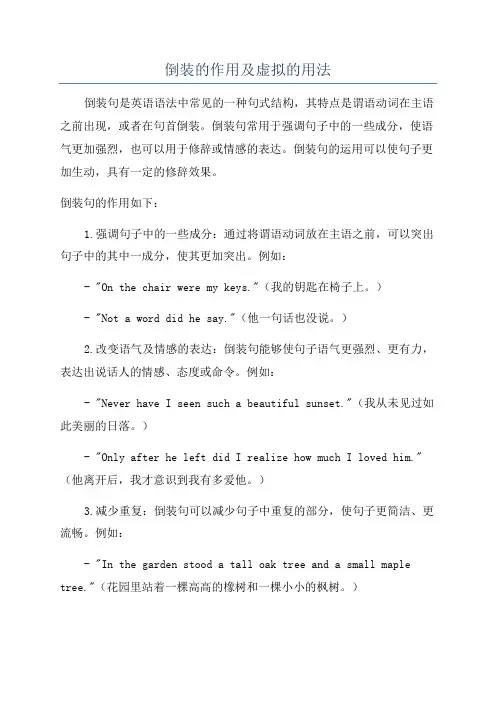
倒装的作用及虚拟的用法倒装句是英语语法中常见的一种句式结构,其特点是谓语动词在主语之前出现,或者在句首倒装。
倒装句常用于强调句子中的一些成分,使语气更加强烈,也可以用于修辞或情感的表达。
倒装句的运用可以使句子更加生动,具有一定的修辞效果。
倒装句的作用如下:1.强调句子中的一些成分:通过将谓语动词放在主语之前,可以突出句子中的其中一成分,使其更加突出。
例如:- "On the chair were my keys."(我的钥匙在椅子上。
)- "Not a word did he say."(他一句话也没说。
)2.改变语气及情感的表达:倒装句能够使句子语气更强烈、更有力,表达出说话人的情感、态度或命令。
例如:- "Never have I seen such a beautiful sunset."(我从未见过如此美丽的日落。
)- "Only after he left did I realize how much I loved him."(他离开后,我才意识到我有多爱他。
)3.减少重复:倒装句可以减少句子中重复的部分,使句子更简洁、更流畅。
例如:- "In the garden stood a tall oak tree and a small maple tree."(花园里站着一棵高高的橡树和一棵小小的枫树。
)虚拟语气是英语中一种特殊的语法形式,用来表达假设、愿望、建议、要求等不真实的情况。
虚拟语气的用法如下:1.表达假设:虚拟语气经常用于表达与事实相反的假设情况。
例如:- "If I were you, I would apologize."(如果我是你,我会道歉。
)(事实上,我并不是你。
)- "I wish I had studied harder for the exam."(我希望我当初考试时学得更努力。
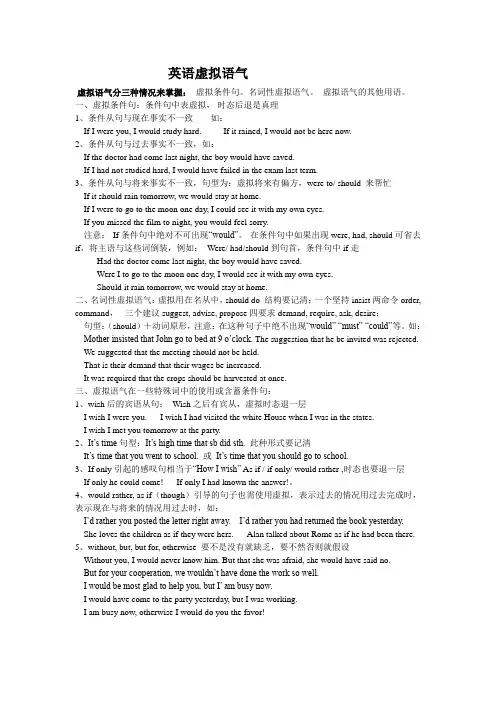
英语虚拟语气虚拟语气分三种情况来掌握:虚拟条件句。
名词性虚拟语气。
虚拟语气的其他用语。
一、虚拟条件句:条件句中表虚拟,时态后退是真理1、条件从句与现在事实不一致如:If I were you, I would study hard. If it rained, I would not be here now.2、条件从句与过去事实不一致,如:If the doctor had come last night, the boy would have saved.If I had not studied hard, I would have failed in the exam last term.3、条件从句与将来事实不一致,句型为:虚拟将来有偏方,were to/ should 来帮忙If it should rain tomorrow, we would stay at home.If I were to go to the moon one day, I could see it with my own eyes.If you missed the film to night, you would feel sorry.注意:If条件句中绝对不可出现“would”。
在条件句中如果出现were, had, should可省去if,将主语与这些词倒装,例如:Were/ had/should到句首,条件句中if走Had the doctor come last night, the boy would have saved.Were I to go to the moon one day, I would see it with my own eyes.Should it rain tomorrow, we would stay at home.二、名词性虚拟语气:虚拟用在名从中,should do 结构要记清;一个坚持insist两命令order, command,三个建议suggest, advise, propose四要求demand, require, ask, desire;句型:(should)+动词原形,注意:在这种句子中绝不出现“would”“must”“could”等。
四级语法辅导倒装㈠.英语句子的语序英语句子通常有两种语序。
一种是主语在前,谓语在后,称为自然语序(Natural order).大部分的句子都采用自然语序。
另一种则相反,谓语在前,主语在后,称为倒装语序(Inverted order).倒装语序又分为两类:1.全部倒装(Whole Inversion):指包括表语或状语在内的整个谓语放在主语之前,它的语序是:表语或状语+谓语动词+主语。
2.部分倒装(Partial Inversion)指谓语中的一部分,如助动词do,does,did,情态动词can,may,should,ought to,must 等,“有”动词have, 系动词be等放在主语之前,其余部分包括谓语动词仍在主语之后。
㈡.分类与应用1.疑问倒装英语的疑问句一般采用倒装。
e.g. Has he left me a book?注:疑问词作主语或修饰主语时,句子不必倒装。
e.g. What makes him think so?2.惊叹倒装在由what和how引起的感叹句中,表语常常放在主语之前;在旧式文学体裁的陈述句中常出现主谓部分倒装表示惊叹:在美国英语中,有时用疑问句的倒装形式表示感叹。
如:e.g. What a wide river it is!Did he look annoyed!3.假设倒装在非真实条件句中,如if被省略,had,were,should需与主语倒装。
如:Had you(=If you had) asked me, I would have told you the answer.( 与过去事实相反) 4.副词倒装⑴.全部倒装a. here, there, now, then 置于句首而主语不是人称代词时。
e.g. Then came a girl.比较:Then she came.b. 小品词(如out,in,away,off等)或拟声词置于句首时。
e.g. In came the girls talking and laughing.⑵.部分倒装a. 方式副词或often, many a time频度副词置于句首时。
虚拟语气、倒装句型虚拟语气虚拟语气是通过特殊的谓语动词形式来表达的愿望、假设、怀疑、猜测或建议等语气,它不表示客观存在。
一、虚拟语气在单句中的用法常用来表示祝愿、采用固定的倒装句式。
例如:Long live the People ⨯s Republic of China!中华人民共和国万岁!be happy! 快乐!have a good time! 玩得愉快! succeed! 成功!make progress! 进步!二、虚拟语气在复合句中的用法:1. 在非真实性条件句与主句中的用法1) 表示与现在事实相反如果我是你,我会接受邀请的。
If I had time,I would go there.如果我有空,我就去那儿。
2) 与过去事实相反例如:If you had come earlier,you couldn ⨯t/wouldn ⨯t have missed the bus.如果你早点来,你就不会错过那辆公共汽车了。
If he had seen you yesterday,he would have returned your book.如果他昨天见到了你,他就会还你的书的。
3) 与将来事实可能相反例如:If it should rain/were to rain/rained tomorrow,the sports meet would be put off.万一明天下雨,运动会就推迟。
(事实上明天下雨的可能性不大。
)If you dropped/should drop/were to drop the glass,it would break.万一杯子掉下来会打碎的。
4) i f 的省略如果条件句中有were,had,should 等助动词,可将if 省略,而把were,had 或should置于句首,来表达以if 引导的条件句的相同意思。
例如:Should it rain/were it to rain tomorrow,the sports meet would be put off./Had he seen May you 祝你you yesterday,he would have returned your book.5)条件句或主句的省略当有上下文或上下句中的语言环境暗示的时候,表示虚拟语气的从句或主句往往可以省略,以避免重复。
英语语法虚拟语气与倒装句使用虚拟语气是英语语法中的一种特殊句式,用来表达非事实、假设、愿望等情况。
虚拟语气通常与条件句或从句连用,可以用于表达建议、命令、愿望、假设等多种情况。
与虚拟语气相关的一个用法是倒装句,它在语法结构上具有一些特殊的规则。
本文将介绍英语语法中虚拟语气和倒装句的使用。
一、虚拟语气1. 虚拟条件句虚拟条件句表示与事实相反的假设或条件。
常见的虚拟条件句包括与现在事实相反的假设(用过去完成时表示)、与过去事实相反的假设(用过去完成时表示)、与将来事实相反的假设(用一般过去时表示)等。
例如:- If I were you, I would invite him to the party.(与现在事实相反的假设)- If I had studied harder, I would have passed the exam.(与过去事实相反的假设)- If it rained tomorrow, we would stay at home.(与将来事实相反的假设)2. 虚拟命令、建议和要求虚拟命令、建议和要求用于表达愿望、建议或要求。
常用动词有advise, ask, demand, insist, propose, recommend, request等。
例如:- I recommend that he study more.(我建议他多学习。
)- The teacher insisted that the students finish their homework.(老师坚持要求学生完成作业。
)3. 虚拟愿望虚拟愿望用于表达对于现在情况的不满或对于将来情况的期望。
通常使用“希望”(wish)来引导宾语从句。
例如:- I wish I were taller.(我希望我更高。
)- I wish it would stop raining.(我希望停止下雨。
)二、倒装句倒装句是英语语法中常见的一种句子结构,它的主语和谓语动词的位置颠倒。
语法复习:虚拟语气和倒装句知识总结与归纳:虚拟语气:是一种与事实(包括过去,现在或将来)完全相反的陈述,表示假设,愿望,怀疑,推测或后悔。
虚拟语气主要用于条件从句,让步从句和名词性从句。
虚拟语气句型中常见的动词形式:1. 动词过去式2. had done3. would/could/should/might do4. would/could/should/might have done5. were(一)虚拟语气用在与过去事实相反的假设的条件句中:表示假设,后悔或推测。
句型结构:If +主语+had been/done….,主语+should/could/might/would + have done….1. If the illness had been diagnosed a day earlier, it might have made all different.2. If she had told him about the danger, he would not have got hurt.3. If I had known more about giving first aid, I could have helped him.(二)虚拟语气用在与现在事实相反的假设的条件句中:句型结构:If +主语+were / 动词过去式,主语+should/could/might/would +do1. If I had HIV, I would know because I would feel sick.2. If I were you, I would give an AIDS patient a hug.3. 虚拟语气用在与将来的结果相反的假设的条件句中:句型结构:If +主语+were to do, 主语+should/could/might/would +doIf +主语+should doIf +主语+动词过去式(1)If we were to panic, we would not be able to help.(2)If the little girl should take piano lessons, she would have less free time.(3)If I were to live long enough to have a job, I would choose to be a doctor, helping these AIDS patients.注意:虚拟条件句的从句中如果有助动词were; had或should可以去掉if以后用倒装句语序。
英语语法中的倒装句和虚拟语气英语是一门语法非常严密的语言,其中倒装句和虚拟语气是比较有代表性的两种语法现象。
它们的运用非常灵活,不但能够丰富语言表达的层次,还能够措辞优美、言简意赅。
下面我们就来探讨一下这两种语法现象的用法与特点。
倒装句所谓倒装句,指的是在语句中将主语和谓语的位置颠倒的现象。
具体来说,有三种情况:1.整个谓语做倒装。
例如:Never had I seen such a beautiful view before.(我以前从没看过这么美的风景。
)Only by working hard can we achieve our goals.(只有通过努力工作,我们才能实现我们的目标。
)注意,这种倒装通常用于强调句子中的某一部分,比如"never"和"only"这样的副词。
在平常的口语和写作中,这种用法并不常见。
2.助动词和主语的位置互换。
例如:Are you going to the party tonight? -> Are you not going to theparty tonight?He has finished the report. -> Has he finished the report?这种倒装在否定句和疑问句中比较常见。
3.只有谓语的一部分做倒装。
例如:Up the hill walked the little girl.(小女孩沿着山坡走了。
)In the garden sat the old man.(老人坐在花园里。
)这种倒装通常在口语和文学作品中出现,英语中很多歌曲和诗歌也会使用这种语法结构。
总体来说,倒装结构让英语句子的语序独特,增加了句子的语言美感和表达效果。
虚拟语气虚拟语气(Subjunctive Mood)是英语语法中非常重要的一个概念。
虚拟语气主要用来表达一些虚构的假设或者反事实情况,比如愿望、建议、命令、条件句等等。
倒装英语句子正常的语序是“主语+谓语”。
如果谓语或谓语的一部分位于主语之前,这种句式就称为倒装。
倒装句有两种:完全倒装和部分倒装。
一、考查完全倒装1. At the foot of the mountain________ .A. a village lieB. lies a villageC. does a villageD. lying a village二、所谓部分倒装就是谓语中的一部分(通常是助动词,情态动词或系动词)放在前面,其余部分放在主语之后。
命题时主要和动词时态联系在一起考查主语。
1.(1) 常用于倒装结构表示否定意义的单词或短语有: not, never, little,seldom, rarely, hardly, scarcely, barely, nowhere, not until, not only, scarcely/barely /hardly ... when, no sooner ... than等。
Hardly had I arrived home when it began to rain.(2)决不: by no means, in no case, at no time, in no way, under nocircumstances, at no point, on no account, on no condition,2: 句首状语若由“only +副词,only +介词短语,only +状语从句”(only before/ after/ when /if)构成,通常引起部分倒装。
Only in this way can you have a better future.Only after I finish my term paper can I go on holiday3: 以so开头的so ... that“如此……以至于”句型中,应运用倒装结构。
基本结构是: so + adj. / adv. + 助动词+主语+谓语+ that 从句。
So weak is she that she can’t say a word.4: 省略if的虚拟条件句应运用倒装结构5: so / neither / nor位于句首的倒装结构。
I don’t like English, neither/ nor does he.I don’t like English, he doesn’t either.6: as意为“尽管”引导让步状语从句的倒装结构。
1) 形容词/副词 + as+ 主语 +动词Young as he is, he knows a lot about history.2) 过去分词+ as + 主语 + 系动词Well-written as the book is, its author is not satisfied.3) 名词 + as+ 主语 + 系动词Girl as she is, she is brave enough to face any difficulty.4) 动词原形+ as +主语+谓语的另外一部分(通常是情态动词或助动词)Try as we might, we could not bring him around to accept our view.1. I’ve tried very hard to improve my English. But by no means________with my progress.A. the teacher is not satisfiedB. is the teacher not satisfiedC. the teacher is satisfiedD. is the teacher satisfied2. Never in my wildest dreams________these people who are living in such poor conditions.A. I could imagineB. could I imagineC. I couldn’t imagineD. c ouldn’t I imagine3. —Did Linda see the traffic accident?—No, no sooner________than it happened.A. had she goneB. she had goneC. has she goneD. she has gone4. Never before_____in greater need of modern public transport than it is today.A. has this city beenB. this city has beenC. was this cityD. this city was5._______snacks and drinks, but they also brought cards for entertainment when they had a picnic in the forest.A. Not only they broughtB. Not only did they bringC. Not only brought theyD. Not only they did bring7. Of the making of good books there is no end; neither ________any end to their influence on man’s lives.A. there isB. there areC. is thereD. are there1.________by keeping down costs will Power Data hold its advantage over other companies.A. OnlyB. JustC. StillD. Yet2. Only then ________ how much damage had been caused.A. had she realizedB. she realizedC. did she realizeD. she had realized1. _______ fired, your health care and other benefits will not be immediately cut off.A. Would you beB. Should you beC. Could you beD. Might you be2. So difficult ________it to work out the problem that I decided to ask Tom for advice.A. I did findB. did I findC. I have foundD. have I found3.________about wild plants that they decided to make a trip to Madagascar for further research.A. So curious the couple wasB. So curious were the coupleC. How curious the couple wereD. The couple was such curious1. —It’s burning hot today, isn’t it?—Yes,________yesterday.A. So was itB. So it wasC. So it isD. So is it1.________ , he talks a lot about his favorite singers after class. . A.A quiet student as he may beB. Quiet student as he may beC. Be a quiet student as he mayD. Quiet as he may be a student2.________ , Carolina couldn’t get the door open.A. Try as she mightB. As she might tryC. She might as tryD. Might she as try虚拟语气虚拟条件句If there were no air or water, no living things would live on the earth.Were there no air or water, no living things would live on the earth.Without/ but for air or water,no living things would live on the earth.If I had taken your advice, I would have become an experienced doctor.If I shuold have enough money, I would travel the moon this summer.I didn’t know you were ill, or/otherwise I would have come to see you.1.____ to the doctor right away, he might have been alive.A. If he wentB. Were he goneC. Should he have goneD. Had he gone2. If you were older, I ____ you to go there yesterday.A. will allowB. should allowC. would have allowedD. had allowed3. He was very busy yesterday, otherwise he ____ tothe meeting.A. would comeB. cameC. would have comeD. had come4. Without /But for electricity human life _____quite different today.A. isB. will beC. would have beenD. would be5. He had to do some important work at the lab, orhe _____ to help you.A. would comeB. would have comeC. cameD.has come6. If you ____ see Mr. Allen, give him my regards.A. shouldB. wouldC. shallD. willIf it doesn’t rain, I will go camping.7. _____ he be interested in that film, he might go to see it with me.A. ShouldB. Would c. Are D. Were8. They would still be missing at sea if a passing ship _____ them.A. did not spotB. had not spottedc. was not spotting D. would not spot1. 错综时间条件句:有时在非真实条件句中,主句谓语动词所表示的动作和条件从句中谓语动词所表示的动作并不同时发生,这时主句和从句的谓语动词要根据各自所指的不同时间选用适当的虚拟语气形式。